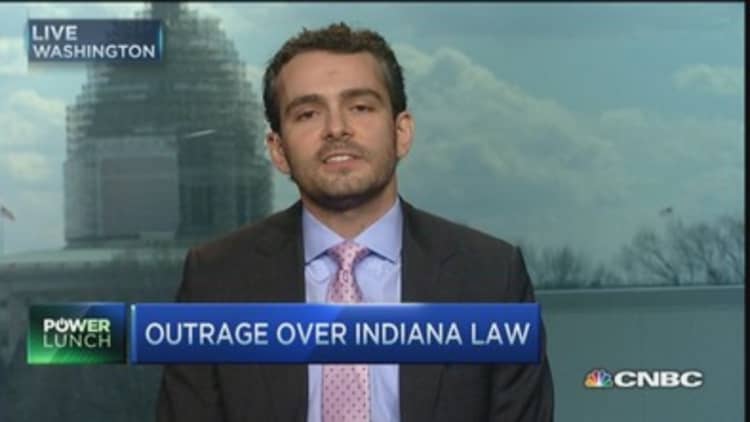Can the technology industry be a fervent opponent of anti-gay discrimination while simultaneously a cozy boys club accused of discriminating against women? These are the two prevailing narratives about the current state of tech, and they're colliding in a big way.
In recent days, the leaders of Salesforce.com, Apple and Yelp have come out swinging against Indiana lawmakers on gay rights, and they have inspired legions of techies to follow suit. The recently enacted Religious Freedom Restoration Act allows business owners, based on their religious beliefs, to deny service to customers. It follows the passage of anti-gay legislation in other states.
Read MoreThe Religious Freedom Restoration Act explained
Technology leaders have been taking a particularly public stance against anti-gay discrimination as a highly visible gender-bias lawsuit involving a female venture capitalist and legendary firm Kleiner Perkins Caufield & Byers is fresh on everyone's mind in Silicon Valley. Now the timing of these two events, which straddle the topic of discrimination based on gender and sexual orientation, is forcing the tech community to reconcile its sometimes complicated value system.
"It's good that people are speaking up" about these two issues, said Dave Goldberg, chief executive officer of SurveyMonkey, an online survey provider in Palo Alto, California. "But it doesn't absolve us from the things we need to do to fix this pipeline problem."
The pipeline Goldberg referenced starts with the fact that only 14 percent of U.S. bachelor's degrees in computer science are awarded to women, according to the Computing Research Association.
Read MoreTech firms need to evaluate ties to Indiana: Levchin
Over the past month, the male-dominated culture and practices of Kleiner Perkins were exposed in a gender-discrimination case filed by former partner Ellen Pao. While Kleiner Perkins was declared victorious on Friday, the tech community isn't celebrating.
"I'm not sure there's a huge victory for anyone on either side," said Max Levchin, a PayPal co-founder and chief executive of online lender Affirm. "It's an awful thing to watch, to be completely honest," he said Monday on CNBC's "Squawk on the Street."
Tech pushes for a counterattack
Levchin joined tech leaders, including Salesforce's Marc Benioff, Apple's Tim Cook and Yelp's Jeremy Stoppelman, in repudiating Indiana's perceived anti-gay bill.
"America's business community recognized a long time ago that discrimination, in all its forms, is bad for business," wrote Cook, Apple's openly gay CEO, in a March 29 op-ed for The Washington Post.
Benioff tweeted three days earlier that tech companies should pay attention to the Indiana law and "how it will impact your employees & customers."
Benioff has since filled his Twitter feed on the topic, announcing he's canceling company events in Indiana and thanking Cook and Stoppelman for taking a stand. He also applauded companies such as EMC and Cloudera for leaving a big data conference in the state.
Indianapolis company Angie's List has halted expansion plans to protest the state's new law.
But Indiana isn't the only state facing the tech industry's wrath. Apple's Cook used his op-ed to also call out Arkansas' policy. Stoppelman referenced his earlier opposition to an Arizona bill. And Levchin called the Indiana law an opportunity for companies to proactively take a stand against any governor who may be considering signing discriminatory measures.
Read MoreCook blasts 'religious freedom' law
In other states, that's already happened. Ancestry.com, based in Provo, Utah, has vocally supported a law that bars housing and employment discrimination based on sexual orientation and gender identity.
"Our goal is first and foremost to advocate for things that we think will benefit the business, and we think supporting equality and non-discrimination is just one of those obvious things," said Tim Sullivan, chief executive of Ancestry.com, in an interview. "It's a natural thing for a company to want to influence actions they think are detrimental to their employees or detrimental to their business."

Let's talk diversity
As emotions run high amid a ramp-up of anti-gay legislation, the tech community is still trying to make sense of the Kleiner Perkins-Pao case. The suit has triggered conversations about gender diversity in tech, including the thin ranks of women in leadership roles.
According to data published by tech companies last year, men comprise 70 percent of the workforce at Google, Apple and Twitter, and 69 percent at Facebook. Between 2011 and 2013, only 2.7 percent of companies that received venture funding had a woman CEO, according to Babson College's Diana Report.
Perhaps it's a happy coincidence that with the Pao case sucking up so much oxygen in the room, some found a compelling target to focus on instead: Indiana lawmakers. Whatever problem the industry has with its "brogrammer" culture (a mashup of "bro" and "programmer"), tech leaders agree that giving businesses the legal right to discriminate against gays and lesbians is a giant step backwards.
Read MoreThe Ellen Pao, Kleiner Perkins verdict: Gender not a factor
"Yelp will make every effort to expand its corporate presence only in states that do not have these laws allowing for discrimination on the books," Yelp's Stoppelman wrote in a blog post on March 26.
So we have parallel story lines, both trending on Twitter and inserting themselves into cocktail party conversation. In the end the chatter is about an industry that's wrestling with its own institutional biases.
"It's always been very important for Silicon Valley companies and entrepreneurs' sense of themselves to be seen as in this meritocracy," said Leslie Berlin, historian for the Silicon Valley Archives at Stanford University. "It's a place where the artificial distinctions between people in power and those who don't have power are all erased in the name of how well you can do your job."
That's the idea, at least.


